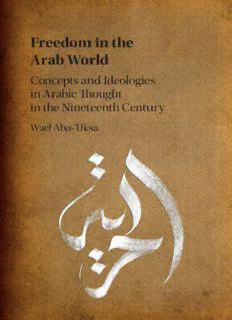
Freedom in the Arab World: Concepts and Ideologies in Arabic Thought in the Nineteenth Century PDF
Preview Freedom in the Arab World: Concepts and Ideologies in Arabic Thought in the Nineteenth Century
Freedom in the Arab World A preoccupation with the subject of “freedom” became a core issue in theconstructionofallmodernpoliticalideologies.Here,WaelAbu-ʿUksa examinesthedevelopmentoftheconceptoffreedominnineteenth-century Arabpoliticalthought,itsideologicaloffshoots,theirmodes,andtheirsub- stanceastheydevelopedthedynamicsoftheArabiclanguage.Abu-ʿUksa tracesthetransitionoftheideaoffreedomfromatermusedinapredomi- nantlynon-politicalway,throughtoitspopularityandnearubiquityatthe dawnofthetwentiethcentury.Throughthis,healsoanalyzestheimpor- tanceofassociatedconceptssuchas“liberalism,”“socialism,”“progress,” “rationalism,”“secularism,”and“citizenship.”Heemploysacloseanaly- sisofthedevelopmentofthelanguage,whilstatthesametimeexamining the wider historical context within which these semantic shifts occurred: the rise of nationalism,the power of the Ottoman court and the state of relationswithEurope. dr. wael abu-ʿuksa is a Polonsky Fellow at the Van Leer Jerusalem InstituteandanassistantprofessorinthePoliticalSciencedepartmentat the Hebrew University of Jerusalem.He is also the author of Liberalism andLeftinArabThoughtafter1990. Freedom in the Arab World Concepts and Ideologies in Arabic Thought in the Nineteenth Century wael abu-ʿuksa TheHebrewUniversityofJerusalem UniversityPrintingHouse,CambridgeCB28BS,UnitedKingdom CambridgeUniversityPressispartoftheUniversityofCambridge. ItfurtherstheUniversity’smissionbydisseminatingknowledgeinthepursuitof education,learningandresearchatthehighestinternationallevelsofexcellence. www.cambridge.org Informationonthistitle:www.cambridge.org/9781107161245 (cid:2)C WaelAbu-ʿUksa2016 Thispublicationisincopyright.Subjecttostatutoryexception andtotheprovisionsofrelevantcollectivelicensingagreements, noreproductionofanypartmaytakeplacewithoutthewritten permissionofCambridgeUniversityPress. Firstpublished2016 PrintedintheUnitedKingdombyClays,StIvesplc AcataloguerecordforthispublicationisavailablefromtheBritishLibrary ISBN978-1-107-16124-5Hardback ISBN978-1-316-61382-5Paperback CambridgeUniversityPresshasnoresponsibilityforthepersistenceoraccuracy ofURLsforexternalorthird-partyinternetwebsitesreferredtointhispublication, anddoesnotguaranteethatanycontentonsuchwebsitesis,orwillremain, accurateorappropriate. To my mother,Nayfi, and in memory of my father,Nasrat Contents Acknowledgments pageix NoteonTranslationandTransliteration xi Introduction 1 Rationale 2 SurveyofLiteratureandtheStudy’sContribution 4 1 ThePoliticizationofFreedom,1798–1820 18 FranceinEgyptandtheLevant,1798–1801 18 EgyptiansandLevantinesinFrance,1801–1820 39 2 AConceptualViewofArabicModernitythrough TwoKeyConcepts,“Civilization”and“Progress” (TamaddunandTaqaddum) 50 Politicizing“Progress”and“Civilization” 50 TimeandtheStructureof“Civilization”and“Progress” 54 TheorizationandInstrumentalizationof“Civilization” and“Progress” 72 3 BurdeningthePoliticalAspectsofFreedom:TheFormative Period,1820–1860 84 Texts,Politics,andTechnologicalDevelopments 84 TheEmergenceoftheLanguageofIndividualFreedom: IndividualPrinciples,Constitutionalism,Sovereignty ofthePeople,andNaturalRights 88 CollectiveAspectsoftheLanguageofFreedom:Freedomof Dynasties,PoliticalEntities,andInstitutions 118 LanguageofNationalism,TransitionsinGroup Appellations,andConceptsofBelonging 122 LanguageofNationalLiberation,1798–1882 138 vii viii Contents 4 TheConstructionofModernIdeologiesinArabic, 1860–1882 156 FromtheIdeasofFreedomtotheIdeologiesofFreedom 156 From“ProponentsofFreedom”toSocialism,Communism, andAnarchism 161 TheorizingFreedom:IdeologiesofTolerance,Autocratic Constitutionalism,andLiberalism 173 Conclusion 205 Bibliography 209 Index 227 Acknowledgments ThisbookbuildsonresearchIhavecarriedoutbetweenOctober2012 andApril2015aftercompletingmyPhD.Thisprojectwasmadepossi- blebythesupportoftheCenterforMiddleEasternStudiesatHarvard University,theFulbrightScholarshipprogram,andthePolonskypost- doctoralprogramattheVanLeerJerusalemInstitute. During the work on the manuscript, I received many suggestions, comments,andwordsofadvicefromfriends,colleagues,andteachers. I owe a great debt of gratitude to Professor Baber Johansen, whose discussions and meetings in the CMES at Harvard were very helpful fortheformationoftheconceptualframeworkofthebook.Iwishto expressmyspecialthankstoProfessorFrumaZachsforherinvaluable commentsonthemanuscript’svariousstages.Hersuggestionshelped inshapingthebookintoitspresentform.Iwouldliketoconveymysin- cere appreciation to Professor Avraham Sela,who painstakingly read andcommentedonthecompletemanuscript.Hisunwaveringsupport before, during, and after my PhD studies also continued through the writingofthisbook.Iamforevergrateful.IamalsoindebtedtoPro- fessor Efraim Podoksik,Professor Shukri Abed,and the readers who were consulted by Cambridge University Press for their valuable sug- gestions. Many people have helped indirectly to get this work done, even though they might not be aware of the importance of their contribu- tions.IwishtoconveymyspecialgratitudetoDrAnatLapidot-Firilla for her assistance and support in the crucial stage of my academic careeraftermyPhD,aswellastoDr.YoavDi-Capua,ProfessorButrus Abu-Manneh,andProfessorReuvenAmitai,whosesupporthasmade thisbookpossible.Iamalsogratefultomylanguage editor,Deborah Schwartz,forherexcellentandhardworkonthetext.Needlesstosay, allerrorsareentirelymyresponsibility. A very heavy burden fell on my family during the writing of this book.IwishtoacknowledgewiththanksthehelpIreceivedfromSally ix
